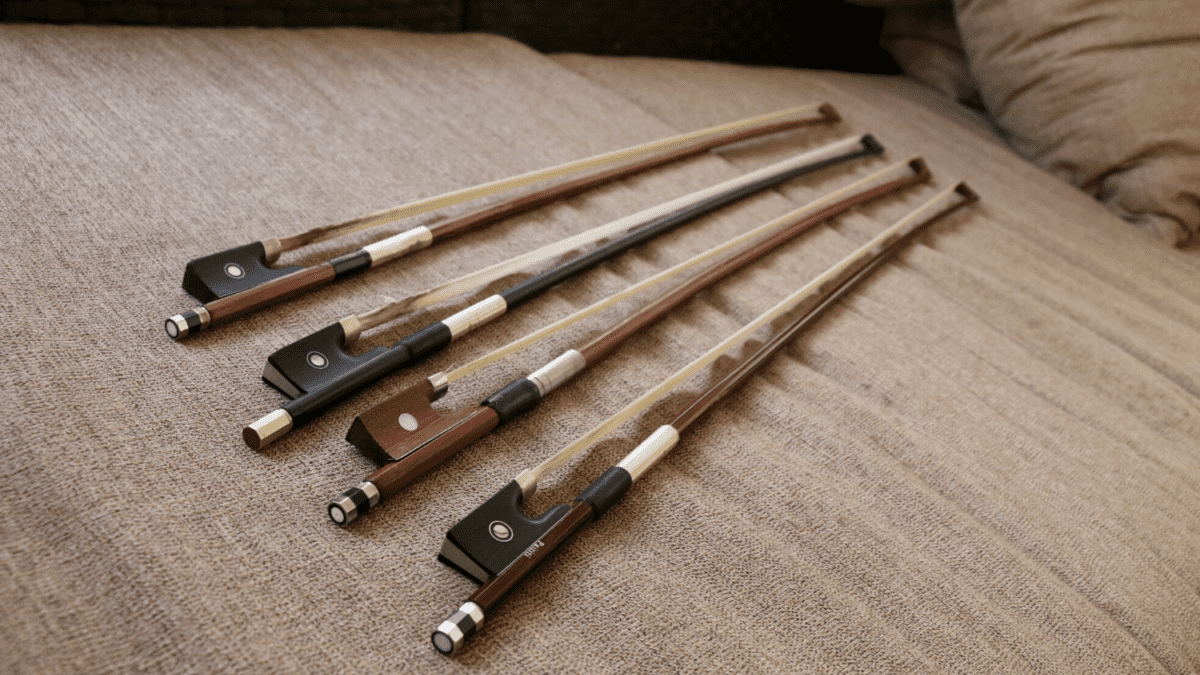
Sometimes we find that we can make tweaks and adjustments to become better violinists. If you didn’t know already, The type of violin bow you use could help you become a better violinist, believe it or not.
The type of bow you use can affect the sound of the violin. For example, some violin bows are made with lighter material that can affect the weight, thus changing the way you balance the violin bow, which can affect the sound of the violin.
The type of violin bow can drastically affect the sound of a violin, but there are various reasons why the kind of bow can affect the way you sound.
The Bow Weight Can Affect The Way You Sound and Play
When I started seriously playing and actively trying to get better at the violin, I had many questions in mind.
I would listen to these fantastic violinists and wonder how they could produce such a beautiful sound. My wondering led me to find the answers to my questions because he who seeketh findeth.
I didn’t pay much attention to small details like changing a violin bow to sound better because I thought that wouldn’t make much of a difference or that it was so insignificant. Still, once I did, I noticed that type of violin bow could actually make a huge difference.
My ex-violin teacher gifted me a bow that was much different than mine. It was much, much lighter than the bow I was previously using.
I noticed a couple of things from this change of bow, however:
- Reduced Bouncing On Strings
- Easier To Control
- Sound Quality Improved
- Very Light
After this experience, I quickly realized the importance of using a good bow! One way you can improve the way you sound is by finding a bow that is fit for you.
Heavy Bows Are Typically Harder To Control

I’ve noticed some things while playing with a heavy bow, and that is that a heavy bow made it harder for me to control various things like:
- The Bounce On The Strings
- Transitioning
- More Difficult To Keep An Even Weight Throughout The Bow Stroke
This doesn’t mean that a heavy bow will be hard for you to control, but rather that they’re typically more challenging to handle for most people.
Most violinists find it difficult not to bounce the bow while playing, especially many beginners.
Heavier bows often make it harder to control the bouncing on the strings. This is because the bow weight is much heavier, and your wrist has more difficulty balancing the weight on the strings.
Bouncing occurs the most while transitioning from an up-and-down bow. If you have trouble with any of these things, I recommend trying out a lighter bow to see how you feel.
Chances are that you will fix most of the problem (as was the case with me). The other part is just improving your technique.
Another thing to note is that you may find it harder to keep an even weight throughout the bow stroke. As I mentioned, you’re more likely to have a hard time balancing a heavy bow than a lighter one because of the weight it puts on your wrist.
It’s all about finding the balance between too light and too heavy. Find out what works best for you.
Light Bows Can Be An Issue Too
I’ve talked about how heavy bows are typically harder to control, but light bows can also be an issue for various reasons.
- Hard To Stop
- It May Feel Hard To Keep Steady
For some, lighter bows may make it difficult to stop while bowing, so they prefer heavier bows. In addition, heavier bows allow them to have more control and they can balance the bow more easily.
Light bows will allow you more mobility and flexibility while playing, but this can also come with a downside.
Some violinists may find it hard to keep a steady hand while bowing since the weight is very light. In addition, too much mobility cause your arm and wrist to be too “wobbly.”
This can affect the sound you make. Your bowing will dictate whether the sound comes out scratchy, bouncy, too soft, too loud, or unbalanced.
As a violinist, you should always ensure that the sound you produce is good. That’s why it’s important to have a bow that fits you.
Is A Lighter Or Heavier Violin Bow Better?

A bow you feel most comfortable in is the best. Every violinist is different, and everyone has a unique style of playing. You should concentrate on what works best for you and adjust according to that style.
It’s about finding the balance between too light and too heavy.
Some violinists prefer heavier bows since they can easily manage and distribute the weight across their bow strokes. At the same time, others may feel that lighter bows offer more flexibility and mobility to them.
However, I recommend starting with something a little more toward the heavy side if you are a beginner.
In the early stages, you’re still developing that mobility in your arm and lighter bows usually require you to have some level of control. Otherwise, it will be harder to manage the weight of the bow.
Heavier bows may offer a little bit more stability while playing, but in the end, it’s all about finding out what works best for you.
The main point here is that you play with a bow that offers you the following:
- Stability
- The Right Amount of Mobility
- Reduces Bounciness on Strings
- It Allows You To Distribute The Weight Across The Bow Stroke Easily
- Good Transitioning
- Feels Comfortable
I suggest trying out a light and heavy bow and seeing which one is better for you.
Having the right bow is essential to creating a quality sound on the violin. However, remember that a violin bow does not answer your problems completely. It’s just a big help.
Although finding the right violin bow is essential, you must also focus on developing proper form and technique to make a difference in how you play. Therefore, practice is a crucial part of your development.
